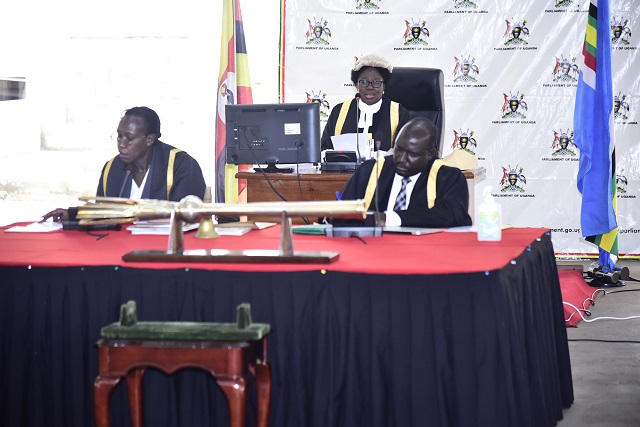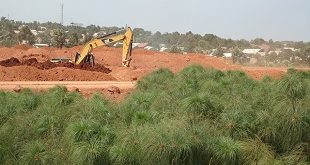
Kampala, Uganda | THE INDEPENDENT | A move by parliament to receive submissions from a section of legislators via video conferencing was on Tuesday afternoon interrupted by technical glitches prompting a halt of their submissions on the Excise Duty (Amendment) Bill, 2020.
Parliament has since last week reduced the number of members attending the plenary sittings from 458 to 100 in order to observe the physical distancing guidelines by the Ministry of Health and the World Health Organisation (WHO) as the world fights the spread of coronavirus disease.
Following registration of several cases of positive COVID-19 cases in Uganda, the Speaker of Parliament Rebecca Kadaga took a decision for legislators to attend the parliament sittings in intervals with majority remaining home.
Now as MPs debated several tax measures under the Excise Duty (Amendment) Bill, 2020, Kadaga noted that several MPs had been lined up to make submissions through video conferencing since they could not physically appear at the Parliament building.
Bukoto South MP Muyanja Mbabali and Nansana Municipality MP Robert Kasule Ssebunya were some of the MPs who had been lined up for submissions via video conferencing only to be failed by technology. These could not be heard by the Speaker despite several calls to them to make their submissions.
The technical glitches forced the speaker to suspend the virtual submissions and proceed without the online sessions.
Before the Speaker took a decision to halt the video conferencing submissions during the debate, Kira Municipality MP Ibrahim Ssemujju Nganda suggested that his colleagues should be advised on the dress code even when making submissions online. Kadaga noted that the matter would be addressed.
Meanwhile, Parliament approved the increase of excise duty on petrol by 150 Shillings per litre from 1,200 to 1,350 Shillings despite a Finance Committee recommendation against the increment.
But Parliament rejected the increase of excise duty on Kerosene from 200 to 300 Shillings per litre during the debate on the Excise Duty (Amendment) Bill. Also rejected is the increase of excise duty on wine made from locally produced raw materials from 2000 to 2300 Shillings.
The Finance Committee report presented by the Chairperson Henry Musasizi noted that due to the current situation caused by coronavirus pandemic, where the whole country is on lockdown with all major production sectors of the economy closed, there was a need for the current excise duty rates to be maintained so as to stimulate the economy and enable it to recover.
Similarly, Ssemujju said that this was not the time to increase taxes on key goods saying that the act could lead to loss of jobs to the majority of Ugandans in the economy already hit by the coronavirus pandemic.
But Minister of State for Urban Development Isaac Musumba differed with the committee position on the rejected taxes saying that the report does not give the impact on the country’s revenue.
“I am hard-pressed to differ from the position of the committee. We have obligations to the country, bigger obligations even after Coronavirus,” Musumba said.
Speaker Kadaga also observed that the recommendations would affect the revenue generation of the country asking MPs to consider a win-win situation.
The Parliament also resolved to exempt excise duty on raw materials used in the manufacture of sanitary pads. According to the Finance committee, the exemption is meant to reduce the cost of sanitary pads and offer relief to girls especially those in rural schools who miss or drop out of school because they cannot afford the sanitary wear. A packet of sanitary pads cost an average of 3000 Shillings on the market, which is slightly expensive for girls in rural settings.
A study on the status of menstrual health management published last year by the Ministry of Education indicated that about 23 per cent of Ugandan girls in the age group of 12-18 drop out of school when they begin menstruation.
Amuru Woman MP Lucy Akello supported the exemption of raw materials used in the manufacture of sanitary pads saying that this will help reduce the cost of the sanitary towels.
Other Taxes
Parliament also approved the exemption on fruit juice and vegetable juice, made from of least 30 per cent of pulp from fruit and vegetables grown in Uganda. The government had proposed to reduce the rate of excise duty on fruit and vegetable juice, except juice made from at least 30 per cent pulp from fruit grown in Ugandan from 300 Shillings per litre to 250 Shillings per litre.
However, the Finance Committee told parliament that although the government indicated that this measure was expected to lead to a loss of Shillings 0.15 billion, it is a welcome measure since it will directly support the fruit and vegetable farmers in Uganda.
Also approved by parliament is a government proposal to reduce the rate of undenatured spirits made from locally produced raw materials from 2000 to 1,500 Shillings per litre.
Inputs and raw materials for the manufacture of tyres, footwear, mattress or toothpaste for a person who meets the capital threshold of investing USD 300,000 in Urban areas or USD l50,000 in Rural areas in case of a citizen of Uganda and USD 10 million for the case of a foreigner were also exempted.
*******
URN
 The Independent Uganda: You get the Truth we Pay the Price
The Independent Uganda: You get the Truth we Pay the Price


